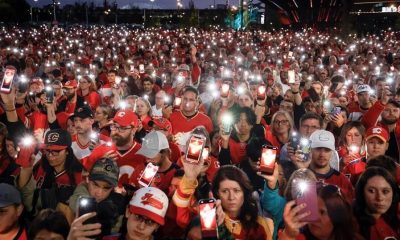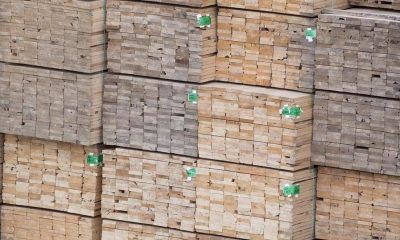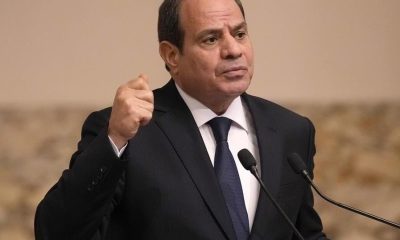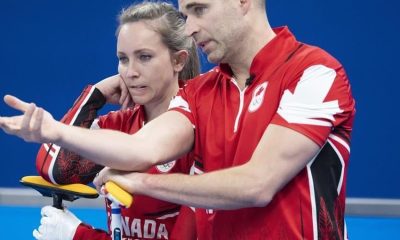The period was bookmarked by divisive debates over religious symbols. The political landscape was upturned as two historic parties crumbled and two upstarts rose. The first female premier was elected. And activist youth shook the province – twice.
Politics
A decade of upheaval in Quebec politics: Religion, corruption, the CAQ, activist youth – Montreal Gazette
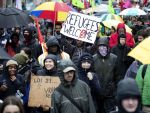
The last decade was tumultuous in Quebec politics and there wasn’t even a referendum.
The period was bookmarked by divisive debates over religious symbols. The political landscape was upturned as two historic parties crumbled and two upstarts rose. The first female premier was elected. And activist youth shook the province — twice.
Here’s a portrait of an eventful decade in Quebec political history.
Dark clouds for Liberals, PQ
Early in the decade, a Liberal — Jean Charest — was premier and the Parti Québécois was the official opposition under Pauline Marois. But in 2010, storm clouds were gathering for the two parties, which had alternated in power in Quebec for more than four decades. Liberal support was collapsing. Media were swirling with stories about corruption in government contracts and criminal control of the province’s construction industry. And voters were telling pollsters they didn’t think Charest would do anything about it. Over at the PQ, Marois’s leadership was under scrutiny. Polls showed francophone voters would happily abandon the party René Lévesque founded for one that didn’t even exist yet. They were intrigued by news that behind the scenes, former PQ minister and businessman François Legault was building a new right-of-centre party that would shelve sovereignty.
Corruption clamour
For two years, just about everybody in Quebec was calling for an inquiry into corruption in Quebec. The key holdout: Charest. He finally relented in October 2011, launching a public inquiry to investigate 1) collusion and corruption in public construction contracts, 2) whether such crimes were linked to political party fundraising, and 3) the role organized crime played in the construction industry. With Justice France Charbonneau at the helm, its hearings were broadcast live and Quebecers were riveted to 261 days of public testimony. Civil servants were being paid off. Above-board contractors were being harassed. Construction and engineering firms were rigging bids. In some cases, the Mafia controlled which companies won contracts, how much they would charge, and got a percentage of the take. The machinations were producing substandard infrastructure and costing taxpayers untold millions. It took four years for the $45-million Charbonneau Commission to publish its final report, a period during which Quebec twice changed government, first turfing Charest in favour of Marois and then replacing Marois with Liberal Philippe Couillard. In its final report in 2015, the Charbonneau commission said corruption and collusion was “widespread and deeply rooted; it made 60 recommendations. A year later, most recommendations had not been implemented, an anticorruption monitoring group said at the time. And three-quarters of Quebecers surveyed said corruption under Couillard was as significant or more significant than under previous premiers.
Youth in the streets, take 1
Quebec youth took to the streets en masse in 2012, demanding a university tuition freeze. They were up in arms against a Liberal government plan to hike tuition fees, among the lowest in Canada, by 75 per cent via annual $325 increases over five years. With small red squares of fabric safety-pinned to their clothes, tens of thousands of protesting CEGEP and university students boycotted classes, regularly paralyzing Montreal streets. Some demos turned violent, making international headlines. Dubbed the Maple Spring, the movement fizzled out in the summer. An election was in the offing and the protesters had an ally in Marois; the PQ leader had worn a red square in the National Assembly for months and at one point clanged pot lids together as she joined a demo. After she won power in September 2012, Marois cancelled the Liberal tuition hike. But she also slashed university funding by $124 million and later hiked tuition by three per cent, or about $70. That hike led to more demos in the spring of 2013, with some now calling for the abolition of tuition fee. Today, Quebec’s tuition is the second lowest in Canada, after Newfoundland and Labrador. In 2019-20, fees jumped by 3.7 per cent, almost twice the rate of inflation.
Historic election
Quebec made history in 2012, electing its first female premier. But Marois’s election night celebration at PQ headquarters was marred by a burst of political violence, a rarity in Canada. The new PQ premier was whisked off the stage as she gave her victory speech. Richard Henry Bain had opened fire outside, killing stage technician Denis Blanchette. Bain later wrote to his psychiatrist that his plan was to kill “as many separatists as possible” and that he would have killed more people had his gun not jammed. Marois’s ascension to power came as another woman was soaring: Françoise David of the left-wing sovereignist Québec solidaire, one of Quebec’s most popular politicians at the time. David’s impressive performance in the leaders’ election debate helped her party siphon votes away from the PQ, depriving Marois of a majority. Marois’s reign was short-lived. After just 19 months, she was defeated by Couillard.
Religious symbols, take 1
Quebecers had spent part of the previous decade arguing over “reasonable accommodation” — the relaxing of rules in favour of people threatened with discrimination. In 2013, Marois tried to exploit resentment among some Quebecers by proposing a Charter of Quebec Values under which public workers — including teachers, professors, civil servants and doctors — would be prohibited from wearing “overt and conspicuous” religious symbols such as burkas, hijabs, kippahs, turbans and “large” crosses at work. The proposal, complete with diagrams to show what could and could not be worn, was highly controversial, with some institutions saying they would defy the law. But the PQ’s charter failed to become law after Marois called an election and was defeated by Couillard. Some attribute her 2014 loss in part to the backlash over her proposed charter.
Rise and fall of PKP
Pierre Karl Péladeau, head of the Quebecor business empire launched by his father, entered politics with a bang in 2014. Standing next to Marois, who had recruited him as a star PQ candidate, Péladeau passionately pumped his fist in the air, saying his main goal was to make Quebec a country. The candidacy of the rich, powerful businessman sent shock waves through Canada; one national magazine ran a photo of a determined-looking Péladeau on its cover, asking: “Is this the man who will break up Canada?” It didn’t work out that way. The fist pump became an enduring image of the ensuing election campaign. That put sovereignty on the forefront, to Marois’s detriment, as many Quebecers were not keen on another referendum. After Marois’s government fell, Péladeau took over as party leader in May 2015. But his tenure was short: he quit just under a year later as leader and MNA. In the midst of a difficult divorce from TV personality Julie Snyder, he cited family reasons. But Péladeau remains a key figure in politics. Quebecor is a print, broadcasting and online juggernaut that is dominated by nationalist voices. And Péladeau is still personally present: he stole the show at a Bloc Québécois rally in August, and he’s not afraid to publicly castigate the Legault government.
The CAQ era begins
Beginning in 1976, two parties dominated Quebec politics, but over the course of the last three elections the Liberals and PQ saw their fortunes sink as Quebecers increasingly looked for fresh ideas. Legault’s Coalition Avenir Québec, a centre-right, nationalist party that brought together federalists and sovereignists, won a decisive majority in 2018. More than a year later, the honeymoon continues. The CAQ easily won a byelection in December and Legault is the most popular premier in Canada. Another relatively new party is also on the upswing. In the 2018 election, Québec solidaire attracted left-wing sovereignists and environmentally-conscious voters away from the PQ. Québec solidaire, born in 2006, has 10 seats in the National Assembly, one more than the fourth-place PQ. The Liberals, for their part, came second in 2018, but that result belies its dire situation. Polls show francophones, who make up the majority in the vast majority of Quebec ridings, want nothing to do with the Liberals. Today, the party, which traces its roots back to 1867, has no MNAs east of its Montreal bastion. Rudderless, the PQ and the Liberals both end the decade desperately looking for a leader who can breathe new life into them.
Religious symbols, take 2
When it comes to religious symbols, the CAQ succeeded where the PQ failed. Buoyed by a rise in nationalism, one of Legault’s first acts as premier was to introduce Bill 21, a law that prohibits government workers deemed to be in positions of authority — including teachers, police, judges — from wearing symbols such as the hijab and the kippah at work. Opposed by many among religious and linguistic minorities, the law, which came into force in June, is popular among the majority, largely Catholic population. The government invoked the notwithstanding clause, which prevents citizens from challenging a law for violating parts of the Charter of Rights and Freedoms. However, lawsuits contending the bill is discriminatory were launched. In December, Quebec’s Court of Appeal rejected a motion to suspend the law while the Superior Court examines whether the law itself is unconstitutional. That court is expected to start hearing the case in the fall of 2020.
Students in the streets, take 2
Seven years after the red-square protests, a new youth movement arose in the dying days of the decade. Inspired by Swedish activist Greta Thunberg, Quebec young people again took massively to the streets in 2019, this time to demand action on climate change. They held weekly Friday rallies, often skipping school, culminating in what was described as the biggest rally in Quebec history. Led by Thunberg herself, an estimated crowd of 500,000 dominated by young people took over Montreal streets in September. The youth-led demand for action helped make the environment a major issue in the federal election, held three weeks after the rally. And after largely ignoring climate change during its rise to power, Legault’s Coalition Avenir Québec government also took notice. Criticized for sitting out this year’s United Nations climate summit, Legault now says he’ll be there next year.
Where were they then?
A decade ago, some of today’s political leaders were not on the front lines.
- Legault quit politics in 2009, lamenting that “Quebec is going into a quiet decline.” He launched the CAQ two years later.
- Interim Liberal leader Pierre Arcand, a former broadcasting executive recently arrived in politics, was Quebec’s environment minister in 2010.
- Manon Massé, co-spokesperson for Québec solidaire, worked for the Centre des Femmes de Laval, while her co-spokesperson, Gabriel Nadeau-Dubois, was a prominent student activist.
- Pascal Berube, now the PQ’s interim leader, was an obscure opposition critic focusing on tourism, wildlife and fisheries.
Quebec by the numbers: Then and now
Population
2010: 7.9 million
2018: 8.4 million
Number of people 100 years old or older
2010: 1,773
2018: 2,340
Mother tongue, Montreal Island
2006:
French: 48.7%
English: 16.8%
Other: 31.8%
Multiple: 2.7%
2016:
French: 46.1%
English: 16.1%
Other: 33.2%
Multiple: 4.6%
Average single-family house value, city of Montreal
2010: $398,000
2019: $601,000
Minimum wage
2009: $9
2019: $12.50
Per capita greenhouse gas emissions
2010: 10.4 tonnes
2018: 9.6 tonnes
Top source of immigrants
2007-2011: France
2012-2016: China
Unemployment
2010: 8 per cent
2018: 5.5 per cent
Support for sovereignty
2010: 42 per cent
2018: 31 per cent
Sources: Institut de la statistique du Québec, Statistics Canada, City of Montreal, —Léger Marketing , Ipsos
Politics
Political Earthquake in British Columbia: Kevin Falcon Suspends B.C. United Campaign, Backs Conservatives
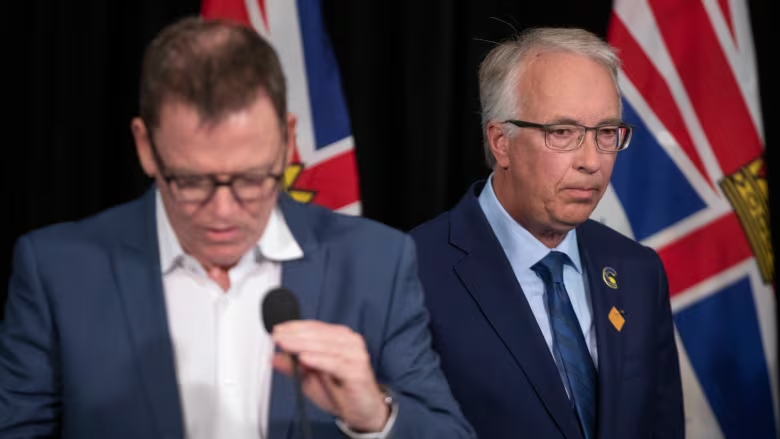
In a move that sent shockwaves through British Columbia’s political landscape, B.C. United leader Kevin Falcon announced on Wednesday that his party would suspend its campaign for the upcoming provincial election and throw its support behind John Rustad’s resurgent B.C. Conservatives. This unprecedented decision has left political watchers and analysts scrambling to make sense of the ramifications for the province’s political future.
Kevin Falcon, who took the reins of the B.C. Liberals—now rebranded as B.C. United—in February 2022, delivered the stunning news at a press conference that left many in disbelief. The former cabinet minister, known for his confidence and assertiveness, appeared uncharacteristically somber and introspective as he explained the rationale behind his decision.
Shachi Kurl, president of the Angus Reid Institute, observed the stark contrast in Falcon’s demeanor. “This is a man who has always exuded confidence, even cockiness, throughout his political career. But today, he seemed on the brink of tears, visibly struggling with the weight of this decision,” Kurl noted. The emotional toll of Falcon’s announcement was evident, underscoring the gravity of the situation both personally and professionally for the B.C. United leader.
The roots of B.C. United’s collapse can be traced back to two key decisions made by Falcon: the expulsion of John Rustad from the party and the controversial rebranding from the B.C. Liberals to B.C. United. Rustad, who was removed from the party in February 2023 for questioning climate change science, quickly capitalized on his dismissal by revitalizing the dormant B.C. Conservative Party. Since then, Rustad has attracted a growing number of former B.C. United MLAs and candidates to his cause, turning the B.C. Conservatives into a formidable political force.
The decision to rebrand the B.C. Liberals as B.C. United, which was meant to signal a fresh start for the party, has been widely criticized as poorly timed and poorly executed. Bill Bennett, a former Liberal cabinet minister, lamented the lack of public understanding of the new brand. “There was no real effort to rebrand and help the public grasp who B.C. United was. The entire process lacked sufficient resources, which ultimately led to its failure,” Bennett said.
Political scientists have been quick to analyze the implications of Falcon’s decision to suspend B.C. United’s campaign. Stewart Prest, a political science lecturer at the University of British Columbia (UBC), expressed shock at the sudden turn of events. “This was a party that, just moments ago, was preparing to compete in this election. To suddenly wave the white flag and step aside in favor of another party is unprecedented. We haven’t seen anything quite like this before,” Prest remarked.
The move has also raised questions about Falcon’s leadership and the future of B.C. United. Gerald Baier, an associate professor of political science at UBC, suggested that Falcon’s decision to expel Rustad may be viewed as the pivotal moment in his leadership. “If Falcon could go back and change one decision, it would likely be the expulsion of Rustad. That move set off a chain reaction that ultimately led to the party’s collapse,” Baier explained.
With B.C. United stepping aside, the B.C. Conservatives are now positioned to become the main opposition to the ruling B.C. NDP in the upcoming election, scheduled for October 19. However, the transition will not be without its challenges. The Conservatives will need to decide which B.C. United candidates to include on their slate, a process that could leave some candidates and voters in a state of uncertainty.
As the political landscape in British Columbia shifts dramatically, the upcoming election promises to be one of the most closely watched and hotly contested in recent memory. The decision by Falcon to back the B.C. Conservatives has not only upended the election but has also reshaped the future of politics in the province. As the dust settles, all eyes will be on John Rustad and his ability to capitalize on this newfound momentum.
In conclusion, Kevin Falcon’s decision to suspend B.C. United’s campaign and endorse the B.C. Conservatives marks a pivotal moment in British Columbia’s political history. The move has raised numerous questions about the future of B.C. United, the leadership of the B.C. Conservatives, and the upcoming election itself. As the province braces for what promises to be a highly volatile election season, one thing is clear: British Columbia’s political landscape will never be the same.
Politics
No conflict in handling of B.C. zero-emission grants, says auditor general
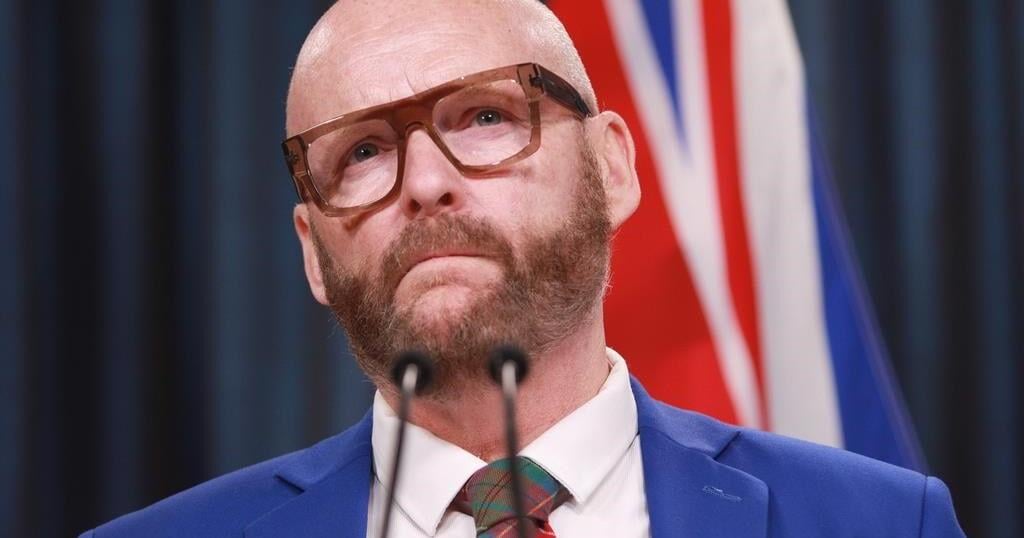
VICTORIA – British Columbia’s auditor general says his office has found no evidence of a conflict of interest in the handling of provincial grants for the zero-emission vehicle sector, after an accusation by a truck maker earlier this year.
Michael Pickup says in a statement the investigation looked into accounting firm MNP’s handling of Advanced Research and Commercialization grant applications, reviewing “a significant amount of information” from the company, the government and all applicants.
Pickup says the results show no evidence MNP wrote grant applications for clients, influenced the evaluation process to benefit clients or used its administering of the program to “recruit” clients for the company’s other services.
In April, the provincial legislature unanimously directed Pickup’s office to examine allegations by electric-hybrid truck maker Edison Motors that MNP was both administering the grants and offering services to help businesses with applications.
The Office of the Auditor General says the allegations from Edison, which is based in Merritt, B.C., suggested MNP “was offering to write grant applications in exchange for a success fee while also deciding who received grant funding.”
MNP said at the time that the allegations were “false and misleading.”
This report by The Canadian Press was first published Aug. 28, 2024.
The Canadian Press. All rights reserved.
News
Prime Ontario agricultural land to be protected amid energy expansion, minister says
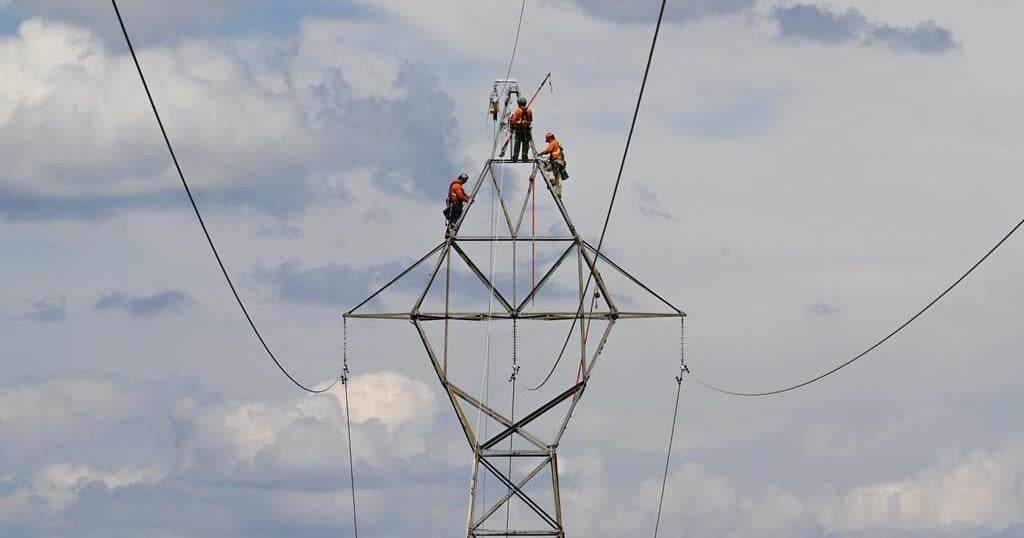
Certain solar farms will be banned on prime agricultural land in Ontario as the province expands energy production to meet demand in the coming decades, Energy Minister Stephen Lecce said Wednesday.
Ontario is looking to add some 5,000 megawatts of energy to the grid, with Lecce directing the Independent Electricity System Operator to secure “technology agnostic” energy resources. That means the province will use a mix of natural gas, hydroelectric, renewables, nuclear and biomass energy sources, he said.
But the province is making efforts to protect key agricultural areas in the process, the minister said.
Ground-mounted solar panels will be prohibited on prime agricultural farmland, said Lecce, who pledged the province would “never misuse” those lands.
“Our farmers need more energy more than ever,” Lecce said.
“They need access to to affordable energy and so we made a commitment to work with them on a policy that ultimately will respect prime agricultural land.”
Other energy products being considered on prime agricultural land will now require an impact assessment before proceeding.
The province is also giving power to municipalities to decide if they want a particular energy project.
“Long gone are the days where Queen’s Park imposes projects on unwilling communities, undermining those agricultural areas,” Lecce said.
The news is welcome to farmers, said Drew Spoelstra, the president of the Ontario Federation of Agriculture.
“The new energy procurement framework is a major step forward for Ontario,” he said.
“Reliable and affordable energy is incredibly important to the growth of the Ontario economy, including food production, food processing and the agri-food sector.”
Farmers and Premier Doug Ford’s government have had an up-and-down relationship in recent years in light of the Greenbelt scandal.
The province had said they were going to build 50,000 homes on the protected Greenbelt, which includes prime agricultural land. But several investigations by provincial bodies found the process was flawed as it favoured some developers with ties to the government over others.
Farmers did not like the possible encroachment onto farmland and joined the chorus to denounce the Greenbelt move. Last summer, amid mounting public pressure to reverse course, Ford walked back those Greenbelt plans.
Lecce’s announcement Wednesday comes as the province’s electricity demand is expected to grow by about two per cent each year, although that could be even higher depending on electrification within the broader economy.
The IESO has said the province will need at least 60 per cent more energy by 2050.
Ontario has also recently been adding electricity storage projects, with an eye to about 2,500 megawatts, and the IESO said the province’s emerging battery fleet will pair well with wind and solar, so that the power generated by those methods can be stored and injected into the grid when needed.
Ford cancelled 750 renewable energy contracts shortly after his Progressive Conservatives formed government in 2018, after the former Liberal government faced widespread anger over the long-term contracts with clean power producers at above-market rates.
The province is also moving ahead with nuclear energy expansion, including seeking to refurbish units at the Pickering nuclear plant, build small modular reactors at the Darlington nuclear plant and exploring a new, large-scale plant at Bruce Power.
In 2021, the electricity system was 94 per cent emissions free, but that is now down to 87 per cent as it uses natural gas to meet demand.
This report by The Canadian Press was first published Aug. 28, 2024.
The Canadian Press. All rights reserved.
-

 News10 hours ago
News10 hours ago‘The deal is done:’ NDP Leader pulls out of supply and confidence deal with Liberals
-

 Health5 hours ago
Health5 hours agoManhood Miracle
-

 Sports4 hours ago
Sports4 hours agoUS Open: Jessica Pegula upsets No. 1 Iga Swiatek to reach her first Grand Slam semifinal
-

 Health3 hours ago
Health3 hours agoAncient Tonic Discovered 6,092 Years Ago By “Seer Of The Gods”… Boosts T — Restores “Horse Power” Libido And Energy In Just 8 Seconds…
-

 News7 hours ago
News7 hours agoCouche-Tard Inc. reports Q1 profit down from last year as consumers watch spending
-

 News4 hours ago
News4 hours agoCanfor shutting two northern B.C. sawmills affecting 500 staff, blames U.S. tariffs
-

 News21 hours ago
News21 hours agoEgyptian President el-Sissi makes his first visit to Turkey, as relations thaw
-

 News8 hours ago
News8 hours agoRoaring Game Returns: Olympic qualification a key storyline this curling season



